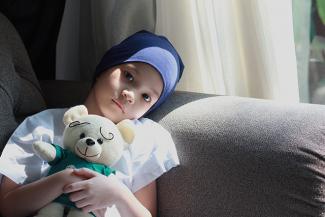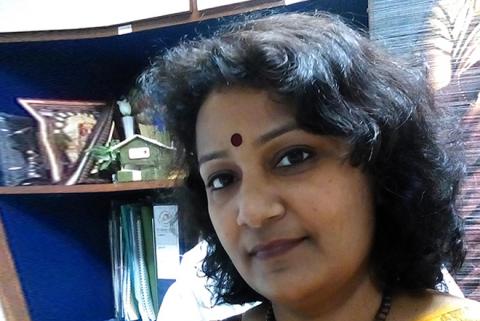
The integration of psycho-oncology into cancer care has significantly helped alleviate emotional and psychological distress for both patients and caregivers. Savita Goswami, psycho-oncologist at Tata Memorial Hospital, discusses some of the psychotherapeutic intervention techniques used in paediatric cancer care.
In recent years, there has been an increasing emphasis on psychosocial interventions in paediatric oncology care. What does it really entail?
In the last two decades, great work has been done establishing evidence based interventions to improve care and outcomes for children with cancer and also their family and caregivers. Psychosocial interventions in paediatric cancer are more of activity and strategy techniques which help to address biological and emotional distress, behavioural, adjustment and cognitive issues. They also help deal with social, environmental and family situations. With evidence based therapeutic approach, we use cognitive behaviour therapy techniques, family therapy, problem solving, and psychoeducation for the child as well as the family. Various activities like play, art, music, expressive writing, and engagement in their hobbies are also integrated in the therapeutic management.
The side effects of cancer treatment itself (chemo, surgery radiation) can lead to difficulties in cognition, poor coping skills and disturbed behaviour. What are the other intervention processes to ensure mental wellbeing of paediatric cancer patients?
During treatment of childhood cancer there are various sources of pain and distress. There are disease related symptoms which leads to distress, there are painful experiences and there are some invasive procedures like bone marrow aspiration, lumbar puncture, intravenous needle pricks, and chemotherapy related side effects, like nausea, vomiting, mucositis. At these moments, a psycho-oncologist plays a very important role in alleviating pain and distress. Evidence based behavioural psychotherapeutic techniques, cognitive behaviour interventions, helps in reducing distress and in preparing children and families for difficult times. Distraction techniques are also very effective with young children. Whereas psychoeducation, relaxation, hypnosis, visualization, imagery are more successful with adolescents and little older children.
Can psychologists step in to make infants and toddlers affected by cancer feel safe and comfortable?
Children below seven are more at risk for behavioural and emotional problems. Tantrums, aggression, noncompliance, uncooperative behaviour, feeding problems – all these issues test parent’s limits. Often it leads to parental distress. Parents feel responsible and guilty about their child’s condition. In this situation, counselling and supporting parents is important. Like I remember, once we had a two-and-a-half year child with pelvic tumour. He was unable to do the physiotherapy because of pain. When the child was brought to us, we had initial rapport building, and then we suggested the parents to bring the musical shoes for the kid. Interestingly, with the musical shoes, the child was more receptive to walking, standing and physiotherapy. So psychologists are required to come up with easy and practical and out-of-the-box interventions.
Unlike in infants, is it a more difficult to counsel adolescents diagnosed with cancer as they are already coping with great physical, cognitive, social developmental issues?
Older children often express emotional reactions like mood swings, anger and sadness, decreased attention, concentration, memory issue. They are worried about their self-image, self-identity, sexual identity. They are more bothered about their peers. They also face discrimination, rejection in the community, in education, in employment, in relationship and marriage, so self-image, poor self and financial instability - all these issues really complicates their life, in spite of overcoming cancer and being cancer survivors.
- Focussed psycho social interventions are very essential for this age group. To address their problems, cognitive behaviour therapy helps them adjust with situational demands, to bring about behavioural, attitudinal change and address their concerns and worries.
- Group activity reduces their feeling of loneliness, helps them connect with friends, family, similar age peers. So connecting with society, community, other group members. Adolescents and young adults get helped by recreational activities, hobbies, expressive act or writing should be encouraged and reinforced.
- Need based psychosocial interventions to empower them, to motivate them and to reinforce them is really required. Psychologists help them to discover their abilities and their strengths.
There are also increasing number of cancer survivors among this age group of adolescents and young adults. In Tata Memorial Hospital, we have After Completion of Therapy clinic (ACT) clinic where all registered survivors come for annual check-ups. Along with their medical and physical check-ups, they also undergo psychosocial and neurocognitive assessment. There is also childhood cancer survivors support group which is actively working for their empowerment.
What is the best tool to capture depressive illness in palliative care?
There are many tools like Center for Epidemiological Studies Depression Scale for Children (CES-DC), Child Depression Inventory (CDI), Child Depression Scale (CDS), Birleson’s Depression Self-Rating Scale for Children - but they all are coming from the Western world. The paediatric population that we cater to comes from very diverse background: they speak different languages; they have different social environmental exposures, diverse economic family and cultural background. The group is quite heterogeneous in all respects. In such a situation, age appropriate communication, proper psychosocial evaluation and complete assessment of situational factor helps to make diagnosis of distress and problems in children.
How do you help patients cope with the stressors at home? What advice do you give them to help in their recovery at home?
When children go home, they have to face their peers, other family members, community and school mates, where they might be questioned about their illness, their appearance, their treatment. In such situations, preparing children with coping strategies helps them anticipate some of the practical difficulties or issues. Like to how to answer questions related to their illness or appearance. Psychoeducation about adapting to change slowly and gradually is also required. Reassuring them that if they unable to do certain things, they are unable to face some things, it is alright. Counselling children and parents about stress management, about engaging in meaningful activities, is also equally important. Motivational counselling to continue schedule of medications, following up regularly with their doctors, maintaining diet routine, following exercise protocol, etc should be reinforced. Collaboratively planning a structured routine helps children to cope up with home atmosphere and get back to normalcy.
The stress of caring for a child with cancer can also affect parents and siblings in multiple ways. How are they counselled to ease their pain and difficulty?
Parents are put under tremendous stress when a child is diagnosed with cancer. The fear of uncertainty and the health of the child leaves them extremely anxious and depressed and emotionally vulnerable. Hence, it is important to provide support to parents, to address their concerns, to understand their attitudes, their strengths, their ability to cope with the situation. A supportive psychotherapy approach can be useful for restoring family functioning and improving interpersonal communication. The successful completion of treatment and quality of life of the child totally depends on the care given by the parents. So addressing parental distress and concerns in an effective manner is essential. Psychologists play a key role when helping parents with distress management. Siblings go through lot a trauma as well. Their life is equally unsettled, so they need support and care. We do sensitize parents about giving equal attention to other siblings. And survivors are also sensitised about caring for other siblings not affected by cancer.
In the last couple of years, the abandonment rate, or patients not wanting to enrol for treatment or stopping treatment half-way, has reduced drastically at Tata Memorial Hospital. What are the reasons for it?
Treatment abandonment rate has gone down significantly in Tata Memorial Hospital due to various factors. Overall, there is a larger support extended to patients and their families now. Like changing administrative policies, changing working systems, providing financial assistance to parents for treatment, ensuring availability of other resources like nutritious food, accommodation, medical kit. Besides, we also provide psychological support to all patients and their caregivers. So facilitating parents in the initial complex process of confirmation of diagnosis and treatment planning is very important. During that time, facilitating information provision through parents support groups, supporting them emotionally and being available for them has made a big impact. Patients feel more confident and in control. That is why the change has taken place and abandonment rate has gone down.
How are concerns about mortality and bereavement handled with a family?
Disease progression or death of a child is one of the most distressing and difficult situation to imagine for the family or the loved ones. It induces a lot of grief and stress in the family. Bereavement interventions are more effective if parents and caregivers are prepared before the loss or before the death of the child. When we talk about grief, it is not just present in the progression of a disease or death of a child, but grief is also associated with major loss of functioning during treatment, for example, amputation. In this situation facilitating communication, understanding concerns and addressing fears is very important. Symptom assessment is also required because if there is intense trauma or intense emotional disturbances, then use of psychopharmaco therapy may be required to settle or stabilize the person.
Is there anything unique that has been brought to the forefront in recent years regarding psycho-oncology?
In psycho-oncology, planning interventions for symptom management and assessment for understanding and reducing psychological defects were there for some quite time, but since the last two decades, psycho-oncology has developed new approaches. Now, we treat children in the context of their families and other systems. There is greater application of developmental perspective and also identifying competence and vulnerability while caring for paediatric patients and their families. Also, more focus has now shifted to integrating psychological knowledge in treatment and decision and other clinical care issues. Hence, cancer care has become more comprehensive. Other areas like facilitating patient and family during transition to palliative care and bereavement care that is now more researched, more evidence based, more structured, which helps in paediatric oncology for better care and quality of life for patients and family caregivers.
















